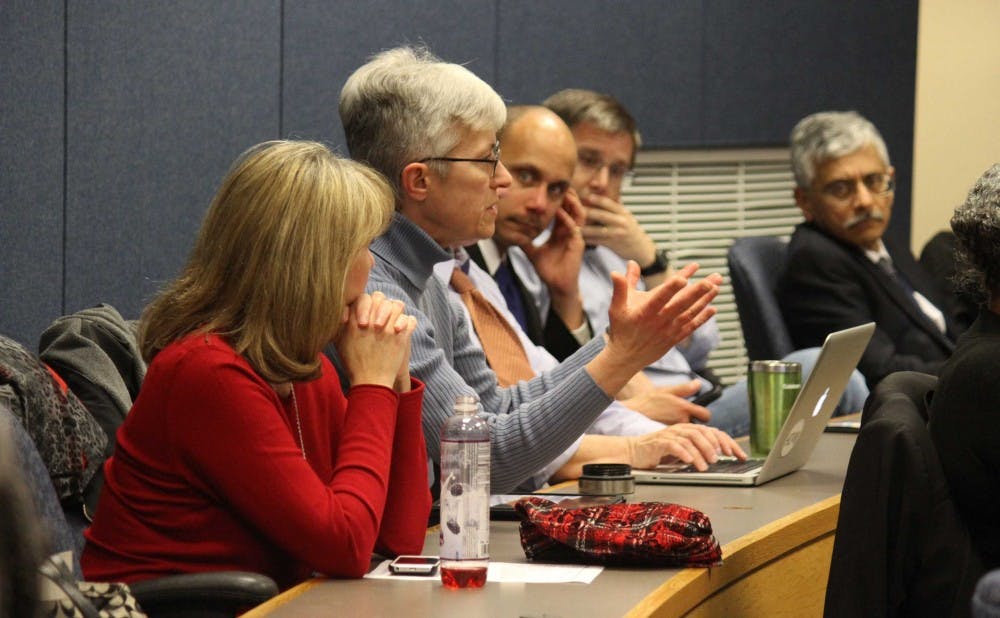In their penultimate meeting of the academic year, the Academic Council discussed the current state of salary equity at the University.
Every two years the Academic Council employs the faculty compensation committee to look for systemic disparities in salary distribution across race and gender at the University. The analysis looks at tenure track faculty across all academic departments.
Because of the incredibly small sample sizes of black, Latino, Native American and two or more identified professors, the statistics of these faculty members were lumped into one category labeled "underrepresented," noted Jerry Reiter, Trinity '92, chair of the committee and the Mrs. Alexander Hehmeyer professor of statistical science. This decision differed from previous biannual reports which did not differentiate between Asian and other underrepresented minority professors. For the racial analysis Caucasians were considered the baseline group, and for the gender analysis men were considered the baseline.
For assistant professors, the median salary of underrepresented groups was .8 percent less than that of the baseline groups. Given the range of error, this result is quite good, said Merlise Clyde, member of the committee and professor of statistical science.
“There is uncertainty. This model is not perfect,” she said. “There is a lot of variation that this model cannot account for.”
Asian assistant professors were found to have slightly higher salaries than other groups. Women assistant professors were found to have salaries about 2 percent less than men.
“We’re not worried about having larger salaries, we are worried about systemic underpayment,” Clyde said.
These findings are largely consistent with the findings of analyses in previous years, she noted.
“There tends to be more variation as we go up in rank,” Clyde said.
For associate professors, women and Asians had almost no disparity with their respective counterparts. Underrepresented groups were paid about 6 percent more than the majority groups.
The results for full professors were nearly the same as the results for associate professors. This year's findings marked an improvement in gender equity—in 2013, the committee found significant differences in salaries between male and female professors.
“We are not finding any sufficient evidence at any rank to find systematic difference in the salaries of men and women,” Clyde said.
Several members of the Academic Council requested access to more information in order to draw their own conclusions about the state of gender-salary divide.
In other business:
Charlie Becker, associate chair of the economics department, presented a proposal for the creation of a master’s degree in analytical political economy.
He said the discussions of this degree began around five years ago, and in the interim the demand for such a program has only increased.
Admissions to current master's programs in economics are booming, with some programs admitting around 6 percent of applicants, Becker said.
But it is the blurring of contemporary issues facing the economy and the American political system that makes this program essential to turning out strong graduates to enter jobs in the economics industry.
“Economics and political science are increasingly two sides of the same coin,” Becker said.
By having this collaboration across economics and political science, students will have access to the resources and academic advising from experts in both fields, he said.
Becker cited a need to innovate and stay ahead of peer institutions in order to continue to attract top-quality applicants.
“Duke’s advantage over every other institution is that we are truly interdisciplinary,” Becker said.
In previous Academic Council meetings, there has been debate over the changing role of master’s degrees at Duke. Although some argue that adding another master’s program is simply a way to bring in extra money for a department, Becker said this is not the case for the analytical political economy degree. Instead, this degree will fill an existing void in preparing students for future work.
“We are not doing this as a cash cow,” Becker said, noting that there will not be substantial financial gain for either the economics or political science departments by adding this program.
The vote to accept or reject the proposal will be taken at the next meeting May 7.
The meeting concluded with a closed executive session in which the honorary degrees for the 2016 commencement were discussed.
Get The Chronicle straight to your inbox
Signup for our weekly newsletter. Cancel at any time.

